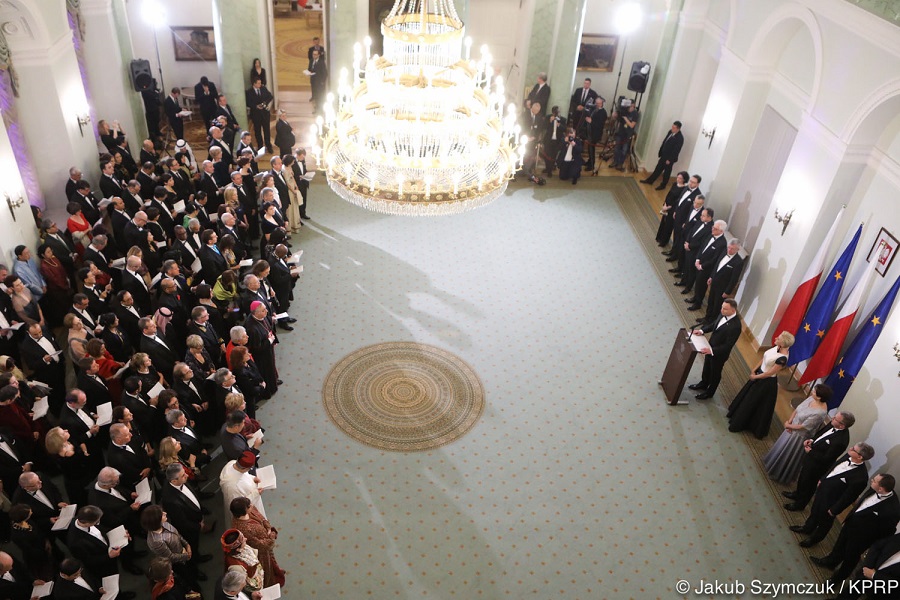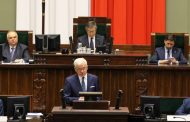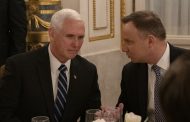Address by the President of the Republic of Poland on the occasion of the New Year’s meeting with the Diplomatic Corps
Thursday, 11 January 2018
______________________________________________________________________________________________________________________________________
Your Excellency, Most Reverend Sir, Dean of the Diplomatic Corps,
Honourable Marshal,
Excellencies, the Ambassadors, Members of the Diplomatic Corps,
Excellencies, Most Reverend Bishops, representing Churches and Confessions,
Distinguished Generals,
Honourable Ministers,
All Distinguished Guests,
I am delighted to greet you at this joint New Year`s meeting of the Diplomatic Corps. On the threshold of the New Year – 2018 we are all aware of multiple challenges facing the international community. I still believe, though, that thanks to cooperation based on trust and good will we shall find constructive solutions to many of them.
2018 is an extraordinary year – the year in which we celebrate the centenary of Poland`s regaining independence. After 123 years of partitions, thanks to the courage of Polish soldiers, but also thanks to the prudence and far-sightedness of politicians and diplomats, having strong support from the nation united around one single goal – that of regaining independence, with allies of our cause both in Europe and over the Atlantic, a convenient historic moment was successfully used and Poland was free and sovereign again. Once again were we able to independently decide about our fate and build a state of our own.
1918, the year of my Homeland regaining independence, brought with it an important international message as well. Therefore, it can be called the year of the triumph of freedom and sovereignty in Central Europe. It is true that in the course of the following century state borders in our region were shifted many times, individual states and nations experienced different twists and turns of history with various external superpowers unsuccessfully trying to consolidate their domination here, through wars and imposed regimes. Notwithstanding the above, the contemporary character of Central Europe: a mosaic of nation states situated between the Baltic, the Adriatic and the Black Sea, is, to a large extent, the heritage of the year 1918 and the then triumph of freedom and self-determination.
I wish for the following message of the centenary of independence to resonate in the international arena: an independent Poland is a valuable part of Central Europe, whereas a sovereign and affluent Central Europe is a valuable part of the common Europe and the world. Europe loses whenever it is subjected to the concert of powers or an external domination, but it wins peace and obtains proper conditions for economic development as long as it knows how to benefit from the richness of all its nations and states.
Therefore, I would like the discussion about the future of the common Europe, which will surely regain its vigour in 2018, to start from the Polish and Central-European experience and the wisdom stemming from that experience.
We want our part of Europe to send a positive signal and make a lasting contribution to the debate on the future of the European Union and the common European market. It is significant not only for the modernization of our Central-European economies and improvement of the living standards of our societies. First and foremost, this voice is necessary today for the entire European Union and the Euro-Atlantic zone. For I am convinced that our community is facing three fundamental threats: a short-term decomposition, a medium-term political disintegration and a long-term strategic deterioration of EU`s global position.
The above-listed processes, protracted over time and space, are occurring today, with varying intensity. Already today we are struggling with the threat of decomposition of the EU (the project of a two-speed EU) or with its political disintegration (as reflected by Brexit). In the not-too-distant future it is going to translate into a growing probability of the deterioration of EU`s global position. As the region of Central Europe, as the entire EU, and last but not least, as the Euro-Atlantic community, we must not let that happen if we want Europe to develop harmoniously. I am convinced that we need to respond to these threats in a resolute way as we speak. We need a wise and prudent reintegration.
Its starting point should consist in the strengthening of the European market with its four basic freedoms. A major step in that direction is providing better integration in terms of infrastructure and economy in Europe along the North-South axis, also with such instruments as the 3 Seas Initiative. We must restore the distorted economic, social, infrastructure and political balance of the EU. Divisions between the North and the South, the East and the West, the centre and the peripheries must be eliminated. Reintegration of the EU should be conducted according to the principles of unity, solidarity and equality of all EU member states. A strong Community also requires a redefinition of Europe`s global position which has to take on board an effective overcoming of such challenges as the migration crisis or lack of stability of the Euro currency.
In order to achieve that, the European Union needs to be capable of reaching an internal compromise and taking pragmatic actions. But first of all, the right hierarchy of values in social life has to be restored. It is not about ideological or political magic spells, but about real values, on which the centuries-long European identity is founded. Europe is not a work of the contemporary politicians, we were endowed with it by generations of European nations who were involved in creating its difficult but equally fascinating history. Whoever claims to have a monopoly on defining what Europe is supposed to be, without asking others about their opinions and taking their arguments into account, is a usurper of the European idea.
Europe is and should be strong with the will of its nations, whereas the community institutions should serve that will. If we reverse that hierarchy and place institutions above nations, we will distort the right order of things. A consequence of such an aberration are societies departing from the idea of the common Europe, a phenomenon we could observe in a series of elections in the old EU member states throughout 2017. EU institutions should shoulder their part of responsibility for the social disappointment with integration and analyse mistakes they made. Community institutions are tasked with conducing a harmonious European policy, rather than stigmatizing, dividing and antagonizing European nations.
I believe that the debate about the future of the common Europe should also include a discussion concerning an opening towards new member states. Given the fact that one country is leaving the EU, we should be ready for new states to join. It is not acceptable that the European Union should be a community of a shrinking number of states or a community which should exclude some member states from the decision-making process. Therefore, Poland will take consistent actions aimed at ensuring European unity without divisions into better and worse, without rationing the right to have a say. We shall consistently expect the European Union to ensure what the treaties refer to as “the loyal cooperation of member states” and defend the principle of subsidiarity in relations with community institutions.
It is true that as a European Union we constitute a community of competition and that everyone has the right to care for their interests. Let us not forget, however, that we predominantly are a community of loyalty and subsidiarity.
A loyal cooperation stands for: the European solidarity, free market without protectionism, solidarity in terms of the budget, equal rights and proportional duties. But in the first place, a loyal cooperation requires that no state shall use instruments of the European policy against another member state and its security, for instance energy security to name one example.
We must demonstrate that the European Union, as a political project, has a future. In this spirit and for the sake of our common interest, we in our region have embarked upon an enhanced cooperation project within the framework of the 3 Seas Initiative. For we are equally committed to the unity of the European Union and to the strength and subjectivity of Central Europe. These two parameters – a united, undivided European Union, with dynamically developing Central Europe as part of it, are indispensable and interdependent. A distortion in the effective functioning of one of them is surely going to impact the performance of the other.
In this vein, an interconnected, dense transportation network along the North-South axis is crucially important. Roads, railways, seaports, airports, inland waterways are all elements of the Single European Market. These are the real tools which enable to bring people closer together, create jobs and improve business opportunities. At the same time, it is indispensable to boost energy security by means of establishing a free gas market in the region of Central Europe, resilient to energy blackmail. And precisely this constitutes the essence of the 3 Seas Initiative.
Ladies and Gentlemen,
The year 2018 not only marks the centenary of Poland regaining her independence. It is also a year of big challenges to the global security. Old conflicts do not die down, whereas new ones keep emerging. The policy of dialogue is struggling to win the competition against the policy of aggression and confrontation. In the light of the above, we feel an even greater deal of responsibility while commencing our 2-year-long membership of the United Nations Security Council. Our decision to run for membership in this most important forum in terms of global security, originated from our deep care for justice and peace in international politics. The motto of our campaign was “Solidarity-Responsibility-Commitment”. Precisely these are the values which we are going to promote during the works of the Security Council and they are going to set the tone for our efforts.
First: solidarity. This idea, so close to Poland and Poles, stands for nothing else but a community of action led by a community of interests. On the global level, solidarity is expressed through respect for international law. It is all about policy which is based on the force of law, not on the law of force. A policy which respects the fundamental principles of international law, i.e. sovereignty and territorial integrity of states.
Second: responsibility. Our priority in the Security Council will also entail actions aimed at strengthening the existing conflict prevention mechanisms, peaceful resolution of disputes and mediation. We are also going to support initiatives aimed at increasing the effectiveness of the UN peace-keeping operations. Due to the interdependent nature of the contemporary world, in which seemingly local conflicts increasingly turn into global challenges, the international community must have at its disposal real tools in order to respond effectively wherever they originate.
And third: commitment. Poland has been consistent in its position that threats to security and peace in the contemporary world should be construed in a multidimensional way. I am referring here among others to the hybrid warfare, terrorism, cybercrime and climate change – the phenomena which often go beyond the scope of work of the Security Council, and which surely require a stronger commitment on part of the international community. The latter item will feature on the agenda of the COP24 climate conference scheduled to take place this autumn in the city of Katowice.
Ladies and Gentlemen,
Another NATO Summit will be held this year as well. I wish it be as successful as the one in Warsaw, in other words: decision-making and bringing deliverables, i.e. continuing the process of enhancing defence and deterrence capabilities of the Alliance. At the same time I hope that we will be able to take further steps in the implementation of the 360° strategy. The security of the Alliance is indivisible, irrespective of the direction of threats and their nature. In order to coordinate efforts aimed at further strengthening the security of the entire Alliance, we are planning to organize, right before the Brussels Summit, a meeting of leaders in the so called Bucharest 9 Format in Warsaw.
We subscribe to the principle that everyone should make a relevant contribution to NATO to ensure the development of our common allied defence capabilities. It is of key importance to maintain the transatlantic bond in good shape, which is important for our security. We are committed to the continued military presence of allied troops in the Eastern flank as a real and tangible increase in our deterrence and defence potential.
Here, I wish to stress with satisfaction that last year we welcomed to Poland allied troops as part of the bilateral cooperation and as a result of the decisions taken at the Warsaw NATO Summit. The presence of allied troops in Poland is the most visible sign of a true solidarity among Allies. I wish to thank representatives of the states whose soldiers are stationed in the territory of Poland for this presence. I would also like to underscore that Poland too is carrying out tasks resulting from the same allied solidarity. We are going to continue our military missions abroad as part of NATO contingents and want to actively restore our participation in UN-led peace-keeping operations.
At the same time, we are pleased with the establishment by EU member states of the permanent structured cooperation in the area of defence (PESCO). It surely bodes well for the future. We hope that the cooperation will serve equally all community members and that its character is not going to interfere with the development of collective defence capabilities of NATO.
Ladies and Gentlemen,
The contemporary international relations are not merely political relations. Economic diplomacy fills them with important content. Last year I led a series of very successful economic missions on four continents, which have brought tangible benefits for the development of Polish economic contacts. I want to carry on with the implementation of that task in 2018, both when hosting leaders of partner states in Poland and during my foreign visits. Polish economy is developing dynamically while Polish companies are more and more resolute in entering foreign markets, including the non-EU ones. I am convinced that Polish companies will continue their expansion in the nearest future and that the process will even accelerate. Therefore, I do encourage you to take actions conducive to forging closer ties between Polish companies and businesses from your countries.
We wish to be active in building the economy of the 21st century in cooperation with international partners. An innovative and competitive economy which will also promote equal treatment of all parties. I am aware that in order to attain that ambitious goal we need partners from all continents.
Ladies and Gentlemen,
The centenary of regaining independence is a celebration for 60 million Poles living across the globe. The Polish community abroad constitutes the biggest asset of Polish foreign policy. I am proud that Poles living abroad are active in manifesting their attachment to Homeland, to the Polish language and Polish culture. I am also happy to see their successful participation in the social, cultural and economic life of the countries which they have chosen as their second Homeland, contributing, by the same token, to their development. There is no doubt that the Polish community abroad is a beautiful showpiece of Poland.
It is my dream that in this year which marks the centenary of regaining our independence, we Poles feel as a community, both in Poland and in all the places where my compatriots live. I, therefore, count on your countries` kind support for the initiatives aimed at honouring the jubilee of our independence. In my capacity as President of the Republic of Poland I plan to visit, in the course of this year, a couple of important Polish centres abroad in order to celebrate, together with my compatriots, freedom and independence.
And in conclusion, let me use this opportunity and extend to all of us wishes of all success in the development and strengthening of the political, economic and cultural relations among our states, and to all the countries which regained independence or become independent 100 years ago, I would like to wish, with all my heart, successful strengthening of their freedom and statehood.
Best wishes in the New Year! Happy New Year!
* * * * *
Zdroj a ilustračné foto: http://www.president.pl/en/news/art,647,address-by-the-president-of-the-republic-of-poland-on-the-occasion-of-the-new-years-meeting-with-the-diplomatic-corps.html







